
The Rise and Fall of the Great Powers
Economic Change and Military Conflict from 1500 to 2000
No se pudo agregar al carrito
Add to Cart failed.
Error al Agregar a Lista de Deseos.
Error al eliminar de la lista de deseos.
Error al añadir a tu biblioteca
Error al seguir el podcast
Error al dejar de seguir el podcast
Obtén 3 meses por US$0.99 al mes
 Exclusivo para miembros Prime: ¿Nuevo en Audible? Obtén 2 audiolibros gratis con tu prueba.
Exclusivo para miembros Prime: ¿Nuevo en Audible? Obtén 2 audiolibros gratis con tu prueba.
Compra ahora por $28.30
-
Narrado por:
-
Peter Coates
-
De:
-
Paul Kennedy
Spanning five centuries of history, The Rise and Fall of the Great Powers offers a sweeping exploration of how nations rise to dominance and fall into decline. Paul Kennedy masterfully examines the intricate interplay between economics and strategy, revealing how shifts in wealth and resources have shaped global power dynamics from 1500 to 2000. Filled with keen insights, this groundbreaking and important work provides a compelling lens through which to understand the forces that continue to shape our modern world.
This audiobook is expertly read by Peter Coates, with audio engineering by Peter Coates and Blake Rook. It was produced and published by Echo Point Books & Media, an independent bookseller in Brattleboro, Vermont.
PLEASE NOTE: When you purchase this title, the accompanying PDF will be available in your Audible Library along with the audio.
©1987 Paul Kennedy (P)2024 Echo Point Books & Media, LLCListeners also enjoyed...




















Las personas que vieron esto también vieron:


















The intelligence of the US special teams and the hunan aspects of the sacrifices they make and the trauma they live with
Se ha producido un error. Vuelve a intentarlo dentro de unos minutos.



